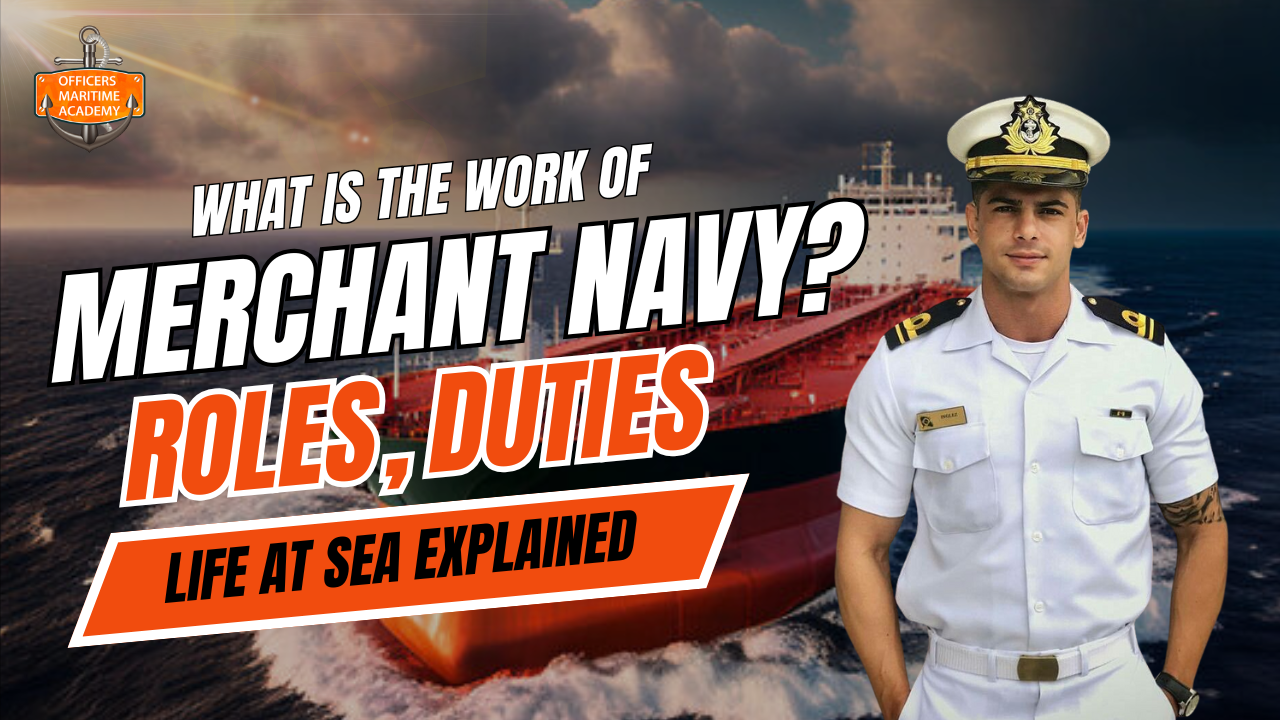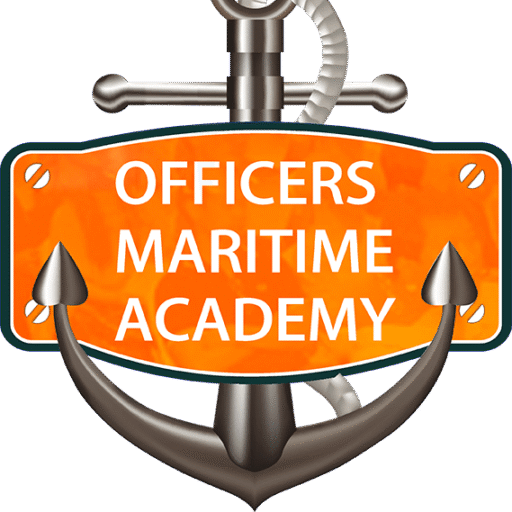What is the Work of Merchant Navy? Roles, Duties & Life at Sea Explained
Ever seen those huge cargo ships on the news or in movies and wondered what exactly goes on there? Yeah, most of us don’t really think about them. But here’s the thing — a big part of global trade depends on them. And behind those massive ships? The Merchant Navy.
Now, before we dive deeper, let’s get one thing straight. The Merchant Navy isn’t part of the military. It’s commercial. Meaning? It deals with cargo, logistics, and transporting goods. So if you’ve been asking yourself, what is the work of Merchant Navy?, you’re about to get the full picture.
What Exactly is the Merchant Navy?
Let’s break it down. The Merchant Navy is basically the backbone of international trade. It’s made up of ships that carry goods, oil, chemicals, passengers, and sometimes even vehicles, from one country to another. Without these vessels, the global economy would take a massive hit.
But wait, is it the same as the Indian Navy? Not at all.
- Merchant Navy = Commercial shipping (private or government-owned).
- Indian Navy = Military and national defense operations.
The two might sail the same oceans, but their missions? Totally different.
Main Roles You’ll Find on a Merchant Ship
When people ask what is the work of Merchant Navy, they’re often curious about the different roles onboard. Ships aren’t run by just one person; it’s a team effort, like a floating office with clearly defined jobs. Here’s a quick look:
Deck Officers
- Captain (Master): The boss of the ship. Responsible for the entire vessel.
- Chief Officer: Manages cargo operations and the deck crew.
- Second Officer: Takes care of navigation and charts.
- Third Officer: Safety equipment and daily watchkeeping.
Engine Department
- Chief Engineer: Handles everything in the engine room.
- Second & Third Engineer: Keep the machinery running smoothly.
- Fourth Engineer: Entry-level officer, works under seniors.
Ratings (Crew)
- Seamen, Oilers, Wipers: Support the officers and handle basic ship operations.
Catering Staff
- Cook and Steward: Because let’s face it, good food keeps everyone sane at sea!
What Do They Actually Do Every Day?
Ah, the million-dollar question — what is the work of Merchant Navy on a daily basis? Life on board is far from boring. Here’s what goes down regularly:
- Navigation – Charting routes, adjusting course, avoiding hazards.
- Cargo Handling – Loading/unloading cargo, securing it, monitoring its condition.
- Engine Work – Monitoring engine performance, fuel levels, fixing machinery.
- Maintenance – Painting, cleaning, repairing — saltwater is tough on ships.
- Safety Checks – Fire drills, lifeboat drills, making sure equipment works.
- Paperwork – Yes, even at sea. Logs, reports, customs declarations — all that admin stuff.
Not every day is the same though. One day you’re docking at a port in Singapore, the next you’re in the middle of the Atlantic avoiding a storm.
Types of Ships You Might Work On
Not all merchant ships look or work the same. Depending on what’s being transported, the duties vary. Here’s a mini crash course:
- Container Ships – Big metal boxes filled with everything from electronics to shoes.
- Oil Tankers – Carry crude oil or refined fuel. High risk, but high pay too.
- LNG/Chemical Tankers – Specially designed for liquid gases or dangerous chemicals.
- Bulk Carriers – Transport coal, grains, ores in large quantities.
- Cruise Ships – Yes, Merchant Navy personnel work here too. These focus on passengers.
- RORO Ships – (Roll-on/Roll-off) For cars, trucks, and big vehicles.
Each type has its own schedule, and challenges.
What's Life Like on a Ship?
Now, here’s the real talk. Life onboard? It’s unique. Some people love it, others can’t wait to get back on land.
- Work Shifts: You work in watches – usually 4 hours on, 8 hours off. It’s a 24×7 operation.
- Accommodation: Tiny cabins but functional. You’ve got a bed, desk, sometimes even a TV.
- Meals: Food is surprisingly good. Multi-cuisine, depending on your crew’s nationalities.
- Recreation: Gym, movies, internet (well, patchy Wi-Fi), game rooms.
- Communication: You’ll miss family, but calls and emails are possible at sea now.
- Voyage Time: Some trips are just 15 days. Others last 6 months. Depends on the contract.
It’s like a mix of college hostel life and adventure travel — with hard work in between.
Who Can Join the Merchant Navy?
Good news — it’s open to most people who meet basic requirements. To join as an officer:
- 10+2 with Physics, Chemistry, Maths (minimum 60%)
- Age: Usually between 17.5 to 25 years
- Courses:
- DNS (Diploma in Nautical Science)
- B.Sc. Nautical Science
- Marine Engineering
And don’t forget:
- You must be medically and physically fit.
- You need to pass an entrance test or sponsorship exam.
Some private institutes offer training with placement support too, but do your research first.
What About Salary and Career Growth?
Let’s be honest — this is what catches most people’s eye first. And rightly so. The pay in Merchant Navy is solid.
- Starting Salary (Deck/Engine Cadet): ₹25,000–₹50,000/month
- Third Officer/4th Engineer: ₹1.2L – ₹2L/month
- Captain/Chief Engineer: ₹5L – ₹10L+/month
Tax-free income (if you meet NRI criteria), travel opportunities, and promotions based on experience and exams — it’s a good deal. But you’ve got to be consistent. Learn on the job, build sea time, and keep up with certifications.
Any Challenges?
Of course. It’s not all smooth sailing.
- You’ll be away from family for months.
- Isolation and mental health can be issues.
- Bad weather and long working hours are real.
- You miss festivals, birthdays, even weddings.
But if you’re the kind of person who loves the sea, values discipline, and enjoys a good challenge, this could be the life for you.
Why Consider a Career in the Merchant Navy?
Alright, so why do people still choose this career despite the challenges?
Here’s what draws them in:
- Adventure & Travel – You see the world on company money.
- High Salaries – Few entry-level jobs pay this well.
- Discipline & Growth – You grow up fast.
- International Exposure – Diverse crews, different cultures.
- Tax Benefits – Who doesn’t like saving on tax?
Plus, some officers eventually switch to port management, shipping companies, or maritime education — it’s not a dead-end.
Final thoughts
So, what is the work of Merchant Navy? It’s diverse, demanding, and deeply rewarding. Whether you’re navigating the seas, maintaining complex machinery, or handling cargo operations — every role is crucial.
Sure, the ocean might be unpredictable. But for those who answer its call, life in the Merchant Navy can be one heck of a ride. Curious to know how to get started? Maybe it’s time to look into a reputable maritime academy or connect with someone already sailing the high seas. A great place to begin your journey is Officer’s Maritime Academy, where aspiring seafarers are trained to become world-class professionals. With expert faculty, modern training facilities, and strong placement support, Officer’s Maritime Academy could be your launchpad into an exciting and rewarding maritime career. Who knows — this could be your next big adventure.

